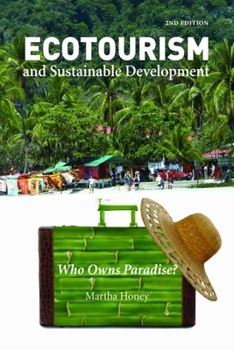Ecotourism and Sustainable Development: Who Owns Paradise?
Select Format
Select Condition 
Book Overview
Ecotourism is defined as responsible travel in natural areas which conserves the environment and improves the welfare of local people. This book presents case studies of seven destinations that serve... This description may be from another edition of this product.
Format:Paperback
Language:English
ISBN:1597261262
ISBN13:9781597261265
Release Date:August 2008
Publisher:Island Press
Length:568 Pages
Weight:1.70 lbs.
Dimensions:1.3" x 6.0" x 9.0"
Customer Reviews
5 ratings
First-hand account of ecotourism projects around the world
Published by Thriftbooks.com User , 22 years ago
Martha Honey argues that the responsibility of ecotourism operators stretches far beyond their physical impact on the land. She argues that real ecotourism must involve seven vital and interrelated characteristics: travel to nature destinations; minimizing negative environmental impact; building environmental awareness; direct financial benefits for conservation; financial benefits and empowerment for local people; the respect of local culture; and the support of human rights and democracy. Her book is an excellent account of worldwide ecotourism.
Ecotourism the inside perspective
Published by Thriftbooks.com User , 24 years ago
I found Martha Honey's book to be thought provoking and informative. During the Fall semester of 2000 I plan to incorporate this text into my tourism studies course. The author successfully addresses the truths and myths surrounding the latest buzz in travel "ecotourism" and brings it together with real-world nation studies topics. I strongly recommend this book for anyone wanting to examine this topic to the fullest.
Best ANAYLTICAL investigation of ecotourism yet published
Published by Thriftbooks.com User , 25 years ago
From the first chapter which defines ecotourism and clarifies its origins, Honey documents and analyzes both the promises and perils of ecotourism. She discusses in various chapters how 'good intentions' or a single logic often miss very negative repercussions for humans and the ecosystem they inhabit. Because the stakeholders have various goals, profit not the least of them, ecotourism is not a panacea for developing countries who might want to take advantage of their natural resources -- in some cases ecotourism is not much better than mining.A major advantage of the book are the several cases: Galapagos, Costa Rica, Cuba, Tanzania, Zanzibar, Kenya and South Africa. A long time resident of several of these countries, Honey is not just a 'quick trip' reporter, but a social historian who gives nuances, contradictions, hopes -- and documents problems.It is a fantastic book!
Highly-recommended investigation of the ecotourism industry
Published by Thriftbooks.com User , 25 years ago
Martha Honey's experience as an investigative reporter serves her well in this exploration of ecotourism. She asks probing questions that traditional travel writers would not, and even describes why this type of journalism is so rare in the travel industry. (Because travel writers are usually the guests of the hotels and agencies they are reviewing, and they are afraid to bite the hands that feed them.). The reader learns about the "greenwashing" that some segments of the travel industry use to mislead travelers with the best intentions, for example the Green Globe awards in which companies can "earn" a green globe award just for signing up with the program and paying the $200 fee! But Honey is not completely unconvinced that true ecotourism can exist. In her seven chapters on individual receptor countries, she describes ecotourism projects that were designed by conservationists with conservation rather than personal profit as a motive. This book provides quantitative and qualitative information, and its fluid prose is a pleasure to read. The book is useful for both the lay traveler and those in the travel industry striving to offer responsible ecotourism opportunities.
An excellent choice for anyone interested in ecotourism
Published by Thriftbooks.com User , 25 years ago
Highly entertaining, joyfully optimistic and painstakingly researched "Ecotourism and Sustainable Development: Who Owns Paradise?" would appeal to both neophytes and those more familiar with the study of ecotourism. The idea echoed throughout the work that one of the world's largest industries is in desperate need of a radical transformation is a very important one and must be recognized by everyone involved in tourism, including the consumer, if the industry is to continue its success into the twenty-first century and, more importantly, contribute to positive social change. The reader should be aware, however, that some of the views expressed in it have not been accepted by all social scientists or ecologists, among them being the idea that protected areas safeguard the environment -- John Vandermeer and Ivette Perfecto's "Breakfast of Biodiversity: The Truth About Rainforest Destruction" is perhaps the best example of a contrasting perspective regarding protected areas. Nevertheless, Martha Honey's latest is truly impressive and would be an excellent choice for anyone interested in ecotourism.





